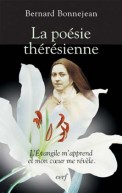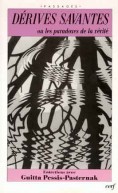
Dur métier d'apôtre (Le)
Collection Cerf Littérature
320 pages - juin 2009
38,50€
Peut-on — si toute forme d'art, toute poésie se définit comme la mise en place d'un système codé visant à la beauté et à l'harmonie — concevoir une poésie réellement catholique, c'est-à-dire « universelle » ? Comment concilier la double exigence, esthétique et spirituelle, du plaisir du lecteur et de son édification ? Une poésie catholique vraie doit-elle d'ailleurs viser un public, et quel public ? Déjà conquis parce que adhérant aux mêmes croyances ou, au contraire, à séduire, à convaincre par l'harmonie versifiée du message évangélique ? Ce sujet dépasse d'ailleurs l'unique question littéraire pour toucher à la spiritualité ; et le choix a paru essentiel à la plupart des poètes confrontés à la double exigence de la création, autonome par essence, et d'une célébration pas toujours figée, mais limitée par des préceptes catéchistiques, infranchissables sous peine de n'être plus conformes à l'orthodoxie. En réalité, tous les critères d'ordre uniquement esthétique concernent aussi le sens métaphysique de la poésie catholique. L'artiste chrétien se sent l'élu de Dieu : il est convaincu d'avoir reçu de lui l'inspiration, ce don de l'Esprit qui, par son souffle, fait de l'homme un poète, celui à qui — étymologiquement — il donne la capacité, ou mieux la mission, de créer à l'image du Créateur. D'où l'attention portée à l'art poétique, qui n'est pas seulement l'art de faire de la poésie, mais la résolution de la grande énigme de la Création et de la place de l'homme, du créateur, dans le cosmos.
--
If all forms of art, all poetry, are defined as the establishment of a coded system which aims to achieve beauty and harmony, can we conceive of a truly catholic poetry, i.e. ‘universal’? How can we reconcile the dual exigency, aesthetic and spiritual, of the reader’s pleasure and his edification? Should truly catholic poetry aim at a particular readership, and if so, who? Those already convinced, because they adhere to the same beliefs? Or, on the contrary, those who remain to be convinced by the harmony in verse of the Gospel? This question reaches beyond the literary issue and touches upon spirituality. The response has appeared essential to most poets confronted by that dual exigency of creation - autonomous by nature - and a celebration which is not always rigidly defined yet established by the catechistic precepts, which must be respected if the work is to remain within boundaries of orthodoxy. In reality, all the uniquely aesthetic criteria of order also concern the metaphysical meaning of catholic poetry. The Christian artist feels he is God’s chosen one: he is convinced of having received inspiration from God, a gift of the Spirit which, by its force, makes man a poet, the one to whom – etymologically – God gives the ability, even the mission, to create the image of the Creator. This is what makes poetry so interesting: it is not simply the art of writing rhymes, but the solution to the great enigma of Creation and man’s place - the creator’s place - in the cosmos.
--
If all forms of art, all poetry, are defined as the establishment of a coded system which aims to achieve beauty and harmony, can we conceive of a truly catholic poetry, i.e. ‘universal’? How can we reconcile the dual exigency, aesthetic and spiritual, of the reader’s pleasure and his edification? Should truly catholic poetry aim at a particular readership, and if so, who? Those already convinced, because they adhere to the same beliefs? Or, on the contrary, those who remain to be convinced by the harmony in verse of the Gospel? This question reaches beyond the literary issue and touches upon spirituality. The response has appeared essential to most poets confronted by that dual exigency of creation - autonomous by nature - and a celebration which is not always rigidly defined yet established by the catechistic precepts, which must be respected if the work is to remain within boundaries of orthodoxy. In reality, all the uniquely aesthetic criteria of order also concern the metaphysical meaning of catholic poetry. The Christian artist feels he is God’s chosen one: he is convinced of having received inspiration from God, a gift of the Spirit which, by its force, makes man a poet, the one to whom – etymologically – God gives the ability, even the mission, to create the image of the Creator. This is what makes poetry so interesting: it is not simply the art of writing rhymes, but the solution to the great enigma of Creation and man’s place - the creator’s place - in the cosmos.
- Dimensions : 135x215x22
- ISBN : 9782204080538
- Poids : 410 grammes
Avec la collaboration de : Olivier Bourdelier
DU MÊME AUTEUR
> VOIR TOUS LES LIVRES DE l'AUTEUR
DANS LA CATÉGORIE
Dérives savantes ou les paradoxes de la vérité
298 pages - janv. 1994
Position(s) du sujet francophone
270 pages - févr. 2021








